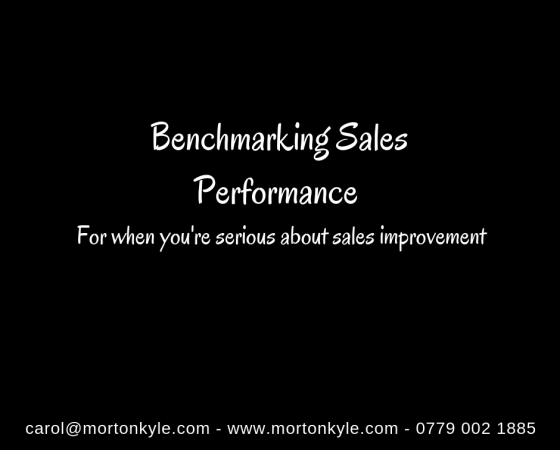Benchmarking sales performance is where is it all starts.
Undertaking any kind of sales improvement initiative without first getting a base line of what your current sales function is achieving, and by what means they are achieving, is akin to map reading in the dark!
Why Should You Be Benchmarking Sales Performance?
Because it’s the very start of any sales improvement process.
And I don’t mean simply benchmarking the obvious sales metrics.
Did you know there are over 130 sales levers you can use in measuring and managing sales effectiveness?
It’s unlikely your sales improvement will cover every single one of those sales levers, and that’s ok.
But not being circumspect in your initial sales evaluation around how your team are performing now is going to hamper the effectiveness of any sales improvement drive.
Ignoring some of the more subtle but very valid sales indicator metrics and their relationship with success in your team is a costly omission.
Failing to understand current sales performance, and how the sales team are operating NOW means that you’ll potentially fall foul of one of the most common reasons WHY sales improvement programs fail.
Your sales improvement efforts will focus on the wrong sales levers, compromising your ability to move the needle on the metrics and habits that reduce risk and guarantee success…
As an example, think of it like this:
You want to make your production line move faster so you can make more money.
What you don’t realise is that the production line will fail at 5% faster, breakdown every day for a minimum of 2 hrs per day at 4 % faster, but only fail for 1 hr per day at 3 % faster, but flows perfectly well when run at an optimum of 2% faster for only three days of the week and 2.7% faster for the other two days.
Now, the question is, how long do you think it would take you to work that out in the workplace?
Weeks?
Months?
A year?
And, how much would it cost you to work that out in the workplace? In money, good will, staff morale, lost customers?
And finally, how much easier would it be if you could simply work all of that out based on historical performance data, using sales intelligence that had been accrued over time?
Now you can, using Sales Systems Thinking.
Sales Functions Are Complex
By their definition, in sales functions there are very few linear relationships between activity and success.
You’ve got to factor in competitor behaviours, buyer traits, seller quirks, as well as the more functional aspects of price, marketing, branding, buying trends and fads.
Sales System Thinking makes the complex simple, bringing clarity to the 130 sales levers at your disposal.
Levers that you can pull in lots of directions.
Perfect for when all you want is to know is what levers to pull in what direction to maximise your chances to be successful in the shortest possible time in the most painless of ways.
Benchmarking sales performance is difficult.
The value it brings to any sales improvement program is immense in terms of clarity and understanding around what has being done in relation to what is being achieved…
And what could be achieved.
The clarity will allow you to move with speed and focus towards where your sales ambitions sit.
Move with less risk and a far greater chance of success.
And take all of the sales team with you.
Benchmarking Sales Performance Builds Strength in the Management Team
In assessing the whole sales function, sales leaders really start to understand the complexities that impact day to day sales results.
The by-products of this is an increased awareness of lead and lagging sales factors.
This forms the pillars of accurate sales forecasting.
In provides insight into sales recruitment, motivation and reward.
Sales plans can be developed to a far higher level.
The risk is in the planning, not in the execution.
In short, the sales leadership team become your very own internal sales trouble shooters.
Benchmarking Sales Performance to Feed the Sales Improvement Launch
I’ve found sales teams going through any kind of change process always behave most receptively when they have information.
Change programs and the people involved fair better when they understand the process.
When there is a logical and shared dialogue around the direction and the aims of the change.
When the key numbers are agreed, understood, transparent and meaningful.
Benchmarking sales performance gives your sales leadership team all the information they need.
Skilled and able to start, drive and complete a sales improvement program within your business.
All whilst developing the skills and insights they need to create a sustainable continuous sales improvement culture.
It gives them context for the role they will play, accountability for what’s expected of them and a yardstick to measure their own performance.
Also providing a common language among their peers, the sales function and the management team.
It knits the key players together at every level, across hierarchies, sites and functions,
What Next?
Benchmarking sales performance is not a one size fits all.
It can be a done for you service, or it can be a workshop delivered with your sales leadership function.
To discuss how it can work in your business call Carol on 0779 002 1885 or email carol@mortonkyle.com to book your confidential discussion.
Benchmarking sales performance is the fastest way to gain clarity on the efficiency and effectiveness of your sales performance, as well as guiding your sales improvement steps.

Hi, welcome to Morton Kyle Limited.
As Founder and Lead Consultant, I’ve spent the last 30+ years in the trenches of sales—fixing broken pipelines, rebuilding underperforming teams, and helping businesses close more deals at higher margins.
I’ve worked with global brands, challenger firms, and fast-growth sales teams, helping them:
✔ Fix underperforming pipelines – turning ghosted leads into closed deals.
✔ Increase win rates – without discounting or chasing bad-fit prospects.
✔ Build sales systems that actually work – so you don’t waste time on ‘busy work’ that doesn’t convert.
I’m not another ‘sales trainer.’ I don’t teach theory. I fix sales problems – fast. And if you’re still reading, it means you’ve got a problem that needs fixing.
I know how sales leaders think because I’ve been one. I know what the board wants because I’ve sat in those meetings.
And I know what works – because I’ve done it, tested it, and proved it across industries, markets, and economic downturns.

